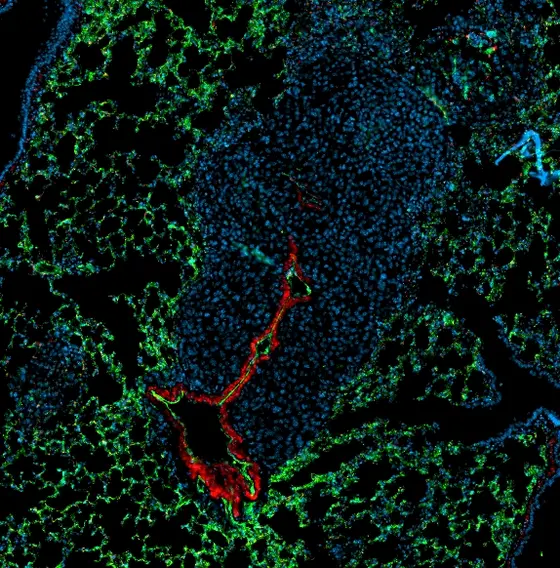Just like healthy tissue, tumors depend on nutrients that they receive via the bloodstream. However, since cancer cells proliferate rapidly and the tumors grow correspondingly fast, a bottleneck can develop here - if new blood vessels do not sprout at the same time. In addition, these new blood vessels are transport routes through which cancer cells reach distant organs where they grow into metastases. One goal in cancer therapy is therefore to prevent angiogenesis, i.e. the formation of new blood vessels, in order to deprive the tumor from nutrients and slow down metastasis. Drugs suppressing angiogenesis have already been in clinical use for more than a decade - albeit with limited efficacy.
Two years ago, Hellmut Augustin's team of researchers from Heidelberg and Mannheim discovered a new target through which this could work: A receptor molecule called Tie1. It is produced in the endothelial cells, i.e. in the cell layer that lines the blood vessels from the inside. It is also known that Tie1 is produced in greater quantities during tumor development and during the growth of blood vessels in the tumor. “We do not know the binding partner of Tie1 and therefore cannot yet say in detail how the receptor works,“ says DKFZ researcher Mahak Singhal, lead author of the current study. But scientists have found out that as cancer progresses, Tie1 helps the blood vessels and tumors to accelerate their growth. In addition, Tie1 destabilizes the walls of the blood vessels and thus promotes the development of metastases. If Tie1 is genetically knocked out in mice, this suppresses both tumor growth and metastasis.
Tie1 is therefore an interesting target for cancer therapy. The scientists consequently set out experiments to generate and test a number of antibodies directed against Tie1. In fact, they were able to identify a promising candidate. If mice with breast or lung tumors were treated with the antibody, cancer growth was slowed down. However, there was no noticeable effect on the formation of blood vessels in the tumors. Importantly, the treated animals showed significantly less metastases compared to untreated mice with breast or lung tumors.
This implies that although the antibody is not able to effectively prevent angiogenesis in the tumor, it has the potential to slow down the formation of metastases during cancer therapy. “However, we have only observed the therapeutic potential of the antibody in experimental animals,“ emphasizes Hellmut Augustin, who is concerned about not raising premature hopes. “Many experiments and studies are still needed before it may one day actually be used to treat cancer patients.“
Singhal M, Gengenbacher N, La Porta S, Gehrs S, Shi J, Kamiyama M, Bodenmiller DM, Fischl A, Schieb B, Besemfelder E, Chintharlapalli S, Augustin HG. Preclinical validation of a novel metastasis-inhibiting Tie1 function-blocking antibody.
EMBO Molecular Medicine 2020, DOI: 10.15252/emmm.201911164
A picture is available for download:
Augustin_Lungenmetastasen_Maus_EMBO.jpg
Caption: A blood vessel (red) grows into the metastasis (blue) in the lung of a mouse.
Note on use of images related to press releases
Use is free of charge. The German Cancer Research Center (Deutsches Krebsforschungszentrum, DKFZ) permits one-time use in the context of reporting about the topic covered in the press release. Images have to be cited as follows: “Source: Augustin/DKFZ“.
Distribution of images to third parties is not permitted unless prior consent has been obtained from DKFZ's Press Office (phone: ++49-(0)6221 42 2854, E-mail: presse@dkfz.de). Any commercial use is prohibited.
